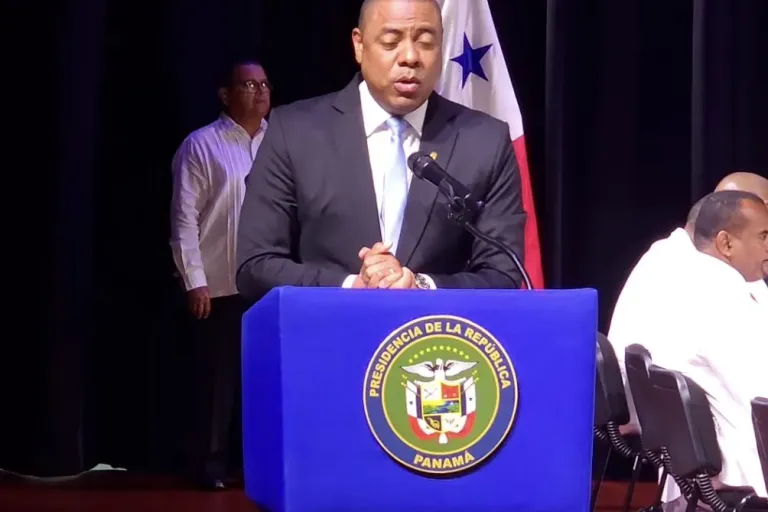Colon Mayor Diogenes Galvan issued a forceful demand to Panama’s national government during independence day ceremonies, insisting it must correct a fiscal system that prevents 2,600 businesses from paying municipal taxes. The mayor delivered his sharply worded address on November 5 during flag day celebrations attended by President Jose Raul Mulino, creating a direct public challenge to the new administration.
Galvan framed the situation as a structural crisis preventing basic municipal functions. He stated that while more than 4,300 companies should theoretically pay taxes in the district, the vast commercial operations centered around the Colon Free Trade Zone and private ports remain exempt from local contributions. This exemption persists despite generating billions in annual commerce.
“The fundamental responsibility of the municipality is to promote comprehensive local development, address collective needs, and seek the well-being of its inhabitants,” Galvan stated. [Translated from Spanish] He immediately followed with, “This mission becomes impossible without the economic resources to carry it out.”
Massive Revenue Losses Detailed in Public Accounting
The mayor provided specific calculations showing the dramatic financial impact on his city. He claimed the municipality would automatically generate 1.3 million dollars monthly if the 2,600 non-paying businesses contributed their fair share. His figures painted a picture of systemic underfunding affecting every aspect of municipal services.
Galvan extended his criticism to international ports operating within the province. These facilities moved 5.6 million TEU (Twenty-foot Equivalent Unit) containers during 2024. The mayor noted that a simple payment of one dollar per container would provide Colon with 5.6 million dollars in critically needed revenue.
“These ports do not pay municipal taxes,” Galvan emphasized with critical tone. [Translated from Spanish] He contrasted their massive operations with their complete absence from local tax rolls.
The interoceanic railway and Heritage Law further complicate the financial landscape according to the mayor’s assessment. He lamented that the railway pays no taxes while remaining “totally distant from the needs of this people.” The municipality also bears responsibility for maintaining more than 210 buildings condemned by the National Civil Protection System and 94 abandoned lots without adequate funding for these essential services.
Special Regimes Create Municipal Funding Crisis
Historical legal frameworks established these fiscal exemptions decades ago. The Colon Free Trade Zone has operated under a special tax regime since its 1948 founding, specifically liberating businesses from municipal tax obligations. Similarly, private ports and the railway maintain concession contracts with the central government that require payments to national coffers but exclude local municipalities.
Additional restrictions come from Law 21 of 1997, which regulates land use in areas near the Panama Canal. Galvan explained that much of his region faces building restrictions that can delay construction permits for up to two years. He described this as a low priority for canal authorities that effectively stifles local development.
The mayor identified what he called a “new tendency” of the Panama Canal exempting its contractors from municipal tax payments. He characterized this practice as both unfair and unsustainable for a municipality struggling to provide basic services. These accumulated restrictions create what Galvan termed unique disadvantages among Panama’s provinces.
“As an administrator, I look up and feel more than fright because no province in this country has so many restrictions for making a true development plan sustainable,” Galvan asserted. [Translated from Spanish]
Direct Appeal to President Mulino During Ceremony
Turning directly to President Jose Raul Mulino, who attended the ceremony with First Lady Maricel Cohen de Mulino, the mayor delivered his most explicit demand. He referenced Colon’s substantial economic contributions to the national economy while highlighting its inability to fund essential local services.
“Mister President, we must do something. What is happening in Colon is not just, a district that contributes more than 17 billion dollars to this country’s GDP,” Galvan stated categorically. [Translated from Spanish]
The mayor confirmed he has presented a formal proposal to correct what he called a “fiscal distortion that suffocates Colon.” He expressed hope that President Mulino would grant him an audience to discuss solutions. Until then, Galvan pledged to continue working with his team of “heroes” despite the adverse conditions.
He illustrated the municipality’s operational precarity with a striking example. The Social Development Department, responsible for addressing homelessness among 154 people living on the streets, operates with just three staff members plus a director. These employees conduct late-night rescue missions every Thursday attempting to restore what Galvan called “lost dignity.”
Emotional Plea for Investment and Transformation
In his concluding remarks, the mayor offered both praise and personal encouragement to President Mulino. He congratulated the president on what he characterized as the courageous expropriation of the Margarita Island area. Galvan then urged the national leader to channel that same determination into generating jobs and opportunities for Colon residents.
The mayor’s tone shifted noticeably as he delivered a more intimate message directly to Mulino. He described the president’s face as resembling “the page of a book written in a difficult language to understand” but noted that his smile gives hope. Galvan concluded by telling Mulino, “That gift, Mister President, not every individual has it. Use it to transform lives.”
This very public appeal places the Government of Panama in a delicate position. It must balance honoring longstanding contractual agreements with major economic operators against the legitimate funding crisis facing one of the nation’s most important commercial districts. The mayor’s detailed revenue calculations and specific examples of service limitations create a compelling case for reform that the new administration cannot easily dismiss.



